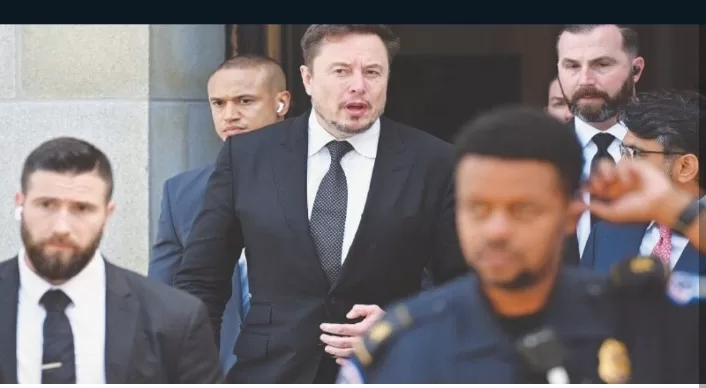WASHINGTON: Prominent figures in the American technology sector, including Tesla’s CEO Elon Musk, Meta Platforms’ CEO Mark Zuckerberg, and Alphabet’s CEO Sundar Pichai, convened with lawmakers at Capitol Hill on Wednesday for a discreet forum focused on the regulation of artificial intelligence.
Lawmakers find themselves in the throes of a challenging endeavor: grappling with the potential hazards of this burgeoning technology. The AI field has witnessed a surge in investment and widespread adoption, notably since the introduction of OpenAI’s ChatGPT chatbot.
Musk, addressing reporters, underscored the necessity for an overseeing authority, stating that a regulatory body was imperative “to ensure that companies take actions that are safe and in the general interest of the public.” Senator Cory Booker from New Jersey lauded the discussion, noting that all participants concurred that “the government has a regulatory role,” even though crafting the requisite legislation posed a formidable challenge.
Legislators seek to establish protective measures against the perils posed by potentially harmful deepfakes, counterfeit videos, election manipulation, and threats to critical infrastructure.
Opening the proceedings, US Senate Majority Leader Chuck Schumer, a Democrat, emphasized the enormity of the task at hand: “Today, we begin an enormous and complex and vital undertaking: building a foundation for bipartisan AI policy that Congress can pass.” He stressed that “Congress must play a role, because without Congress, we will neither maximize AI’s benefits, nor minimize its risks.” Schumer had previously discussed AI matters with Musk in April.
The gathering featured a diverse array of tech leaders, including Nvidia’s CEO Jensen Huang, Microsoft’s CEO Satya Nadella, IBM’s CEO Arvind Krishna, former Microsoft CEO Bill Gates, and AFL-CIO labor federation President Liz Shuler.
Schumer elucidated that attendees would deliberate on why Congress must take action, what questions needed to be posed, and how a consensus could be forged to encourage secure innovation. In March, Musk and a consortium of AI experts and executives advocated for a six-month hiatus in the development of systems surpassing the potency of OpenAI’s GPT-4, citing potential societal hazards.
This week, Congress is hosting three separate hearings on artificial intelligence. During a Senate Judiciary subcommittee session on Tuesday, Microsoft President Brad Smith asserted that Congress should “mandate safety mechanisms for AI governing or managing critical infrastructure.”
Source Reuters




